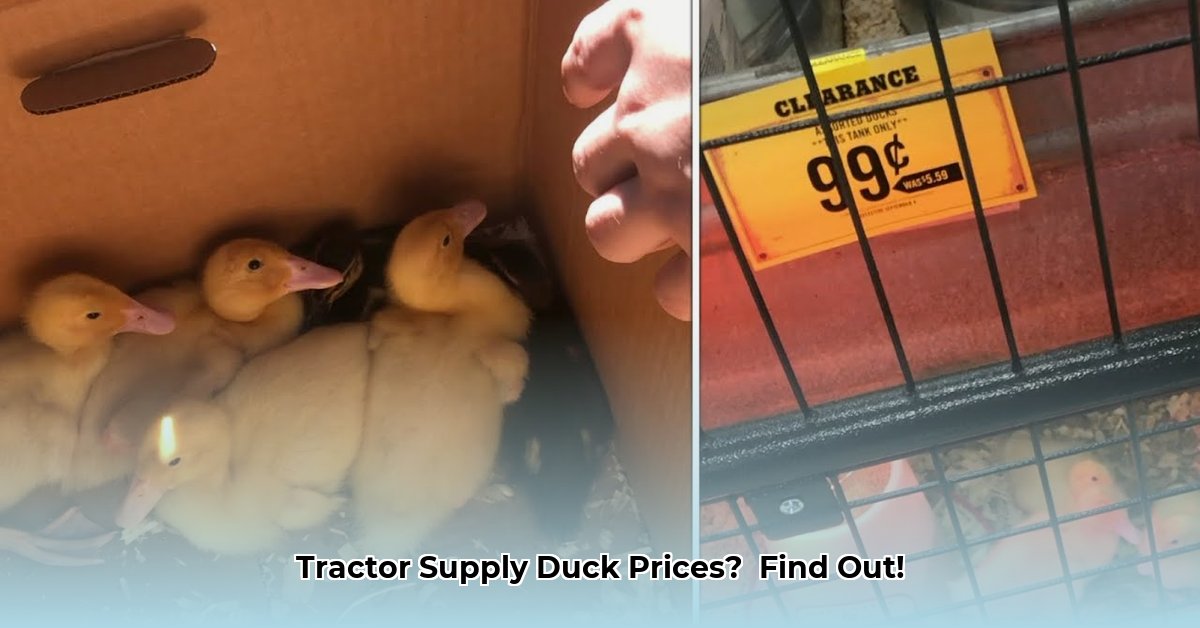
So, you're curious about raising ducks and wondering how much they cost at Tractor Supply? The price varies! Expect to pay between $10 and $30 per duckling, depending on the breed, age, and your location. Seasonal availability also plays a significant role, with prices and availability often higher in spring and early summer. For current Tractor Supply duck availability, check this helpful resource.
Duck Prices & Availability: Finding Your Feathered Friends
To find the most up-to-date prices and check availability, start by visiting your local Tractor Supply's website. Many stores update their online inventory regularly, sometimes showing prices and stock levels. However, online availability isn’t always perfectly accurate. For the most reliable information, call your nearest Tractor Supply store directly. This allows you to ask about current prices and confirm availability before making a trip. Remember that availability fluctuates with the seasons—spring and early summer usually see higher demand, potentially resulting in higher prices and limited availability. You may have better luck in the fall or winter.
Choosing the Right Duck Breed: Matching Birds to Your Needs
Tractor Supply typically stocks several duck breeds, but detailed breed information might be limited on their website. Before purchasing, carefully consider your goals. Are you looking for natural pest control, consistent egg production, or meat? Different breeds excel in different areas.
- Pest Control: Certain breeds are excellent foragers, consuming slugs, snails, and insects. Indian Runner ducks are known for their foraging prowess. But note that the effectiveness of ducks as pest control depends on factors beyond breed selection like the size of your garden and the type of weeds and pests present.
- Egg Production: If egg production is your priority, select breeds known for consistent laying throughout the year. Khaki Campbells are a popular choice for their reliable egg-laying habits. Production varies depending on the breed, and factors like age and environmental conditions play a role in egg output.
- Meat Production: Some breeds are specifically raised for meat production, growing rapidly and efficiently. Research breeds suitable for meat production based on your climate and available resources.
Remember ethical sourcing is paramount. Research the breeder's practices to ensure animal welfare is prioritized before committing to a purchase.
Sustainable Duck Farming Basics: A Step-by-Step Guide
Ready to embark on your duck-farming journey? Here's a practical guide to help you succeed:
- Secure Housing: Ducks need protection from the elements and predators. This could involve a secure coop, a run, or a well-fenced area within your pasture. Account for temperature extremes and implement strategies for keeping birds dry.
- Implement Rotational Grazing: This prevents overgrazing and soil erosion and is good for both the birds and your soil. Move your flock regularly to fresh areas.
- Develop a Balanced Feeding Plan: Supplement natural foraging with commercially available duck feed. Supplement your birds' diet with nutritious options like kitchen scraps (ensure they are safe for consumption; avoid onions, avocado, and chocolate). Worms and insects are natural treats and supplement their diet.
- Responsible Manure Management: Duck manure is excellent fertilizer! Compost it properly to prevent environmental contamination and maximize its fertilizing potential. Efficient manure management is crucial. Aim for composting methods which generate little odor.
- Biosecurity: Disease prevention is vital. Maintain good hygiene, keep your ducks separate from other poultry, and promptly clean and disinfect their housing. Quarantine new birds to prevent the spread of disease.
- Monitor Your Flock's Health: Regular health checks are crucial. Consult a veterinarian experienced with poultry for advice and address any issues promptly. Early detection of problems is key.
- Explore Value-Added Products: Consider selling excess eggs or meat locally at farmers' markets, directly to consumers, or to local restaurants.
Addressing Potential Challenges and Risks
While rewarding, duck farming presents challenges. Disease outbreaks can decimate a flock; predation is a constant threat; and market fluctuations can impact profitability. Effective mitigation strategies are crucial for success:
- Disease Prevention: Strong biosecurity measures and regular veterinary check-ups are essential. Vaccination may also be beneficial depending on your location and the prevalence of certain diseases.
- Predation Control: Secure housing, protective netting, and predator deterrents (guard animals like dogs or donkeys) can minimize losses. Consider the local predators.
- Market Diversification: Explore different sales channels (farmers' markets, online sales, direct-to-consumer) to reduce reliance on a single market and minimize the impact of price fluctuations.
- Animal Welfare: Prioritize humane handling, providing enough food, water, and appropriate shelter.
Additional Resources
Consult your local agricultural extension office or state university for region-specific advice on duck husbandry, disease management, and marketing strategies. They can provide valuable, localized information. A veterinarian experienced in poultry health will be a vital resource for guidance on ensuring the well-being of your flock. Seek out reputable online resources and books dedicated to sustainable duck farming and smallholder agriculture.
[1] Permaculture Practice. Ducks in Permaculture. https://permaculturepractice.com/ducks-in-permaculture/ (Accessed March 10, 2025).